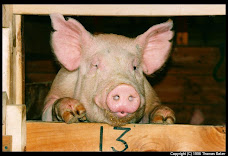In case some of you don't know, Passover started on the evening of March 29. I thought it would be a good idea to let everyone know about this wonderful holiday that Jewish people celebrate each year. I found this article " Don't be ignorant! learn more about the jewish holiday of Passover" by Eric Gillin that asks basic questions that might be the same questions you might be wondering.
If you have anymore questions please feel free to ask me, I don't mind at all!
Jews around the world will start celebrating Passover with a festive meal called a seder. But of all the Jewish holidays, perhaps none of them are as misunderstood and demanding as Passover.
For eight days, Jews are asked to refrain from eating leavened foods made from a wide variety of grains, which for strict adherents means they can eat absolutely nothing that has been prepared in the usual fashion. But while annoying, such dietary restrictions are maintained in order for Jews to feel a closeness with a distant past that's not so far away from the present day.
BT: So, what's Passover all about?
SK: Passover is a holiday the Jews celebrate which observes the historical moment of the leaving from slavery in Egypt and the first steps towards liberation and freedom. But it's both a historical holiday and the celebration of the agricultural time of year. We celebrate the rebirth of spring and the beginning of new life.
BT: What are some of the more notable characteristics of the holiday?
SK: Passover, or Pesach as it's called in Hebrew, might be familiar to some people who are familiar with the word paschal lamb. The word paschal actually comes from the Hebrew word for Passover. So it lasts eight days for many Jews, although some Jews celebrate it as a seven-day holiday. And it begins on Monday night and lasts until next Tuesday night.
The holiday, of all of its notable features, is very focused on observance, to begin with. The first two nights we have a family seder, which is a liturgy and ritual that takes place around a table. A seder also includes the evening meal, but before the meal you have the ritual and then the meal is served and then it's followed by more liturgy. And, some people go all night until the early hours of the morning and others do a more abbreviated version.
And the seder, of course, is also well known to Christians because it was the Last Supper of Jesus Christ. He ate his meal on the Thursday night before Good Friday.
BT: As you've pointed out, there are many similarities between Jewish holidays and those in the Catholic faith. What other examples can you cite?
SK: First of all, central to all Jewish holidays and certainly Passover is a good example of this, is the consecration of the wine and the important presence that ritual wine serves in all of our ceremonies. In the Passover seder, we have four ritual cups of wine that are blessed and drunk over the course of the meal. And bread, of course, is also central.
Passover and the breaking of bread is very important. And at Passover we don't eat bread. We don't eat anything with leavening in it or come in contact with flour. So we eat matzoh, which is what Passover is probably most famous for, which is the flattened crisp matzoh. This is because when the Israelites were leaving Egypt, they didn't have time to let the flour rise, and so they had to take the dough as it was, without given it time to leaven.
So in memory of that rush they were feeling, the experience of terror as the Egyptians were coming and fear and exhilaration of that possibility, we don't eat any bread or leavened products during the entire eight days.
BT: It's understandable that Jews don't eat bread to commemorate the freedom from slavery, but if this is also a holiday to celebrate springtime or harvests, why are there so many things we really can't eat?
SK: Part of it is that a lot of different things can be leavened. That includes all of the different grains out there. Those can be leavened. And then, in Europe, there was this concern that Jews would take what we know as legumes and grind them up and make flour and then by mistake make bread, so to speak. Beans or rice, are examples of what we can't eat. Eastern European people can't eat those products out of fear that they would get mixed up and it would be flour.
BT: What about corn syrup? That pretty much eliminates every food on Earth.
SK: Corn would be on the list of foods you can't eat for the same reason, although many people now do eat corn. There are a wide variety of observances. So many people actually do now do corn and corn products.
BT: What is the most damaging misconception that people have about Passover?
SK: Probably the most damaging one in history of course, was the medieval period when there was the blood libel. People were accusing Jews of killing Christian children and using their blood to make the matzoh.


No comments:
Post a Comment